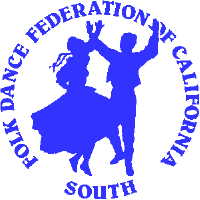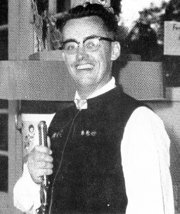
|
Folk Dance Federation of California, South, Inc.
Historical Notes |

|
CLICK IMAGE TO ENLARGE
"Bakmes" is a Swedish dialect word implying "baklänges" (backwards), hence its reference to the reverse turn – or backwards turn – in certain dances. Most of these dances arre found in Western and Northern Sweden, but one also survives in the Swedish districts of Finland (Finlandsk bakmes-polka).
The same reverse-rotation form is found in Norway in one of the figures of Røorospols, so it is not surprising that there are similarities. Compared with the Norwegian Pols, however, it would appear that over the years the Swedish counterpart polska has fragmented, so that some parts of the full "suite" as still danced in Røros today (and can be traced back to the 16th century in Sweden) are found in some places, others in other places. As an example, when the Hambo began to replace the "rundpolska" (as in Gammal polska) in the Transtrand area, the halfturn "bakmes" outlived the fullturn L-ft polska.
As danced in "the old days," the polska and bakmes were far from mundane. To quote from J. D. Lamb, who did research in Western Dalarna recently, "The dance lends itself to show-off figures. It is usual for the man to slap the outside of the right boot from time to time during the bakmes turn, on ct 2. He can also drop to the R knee on ct 1, the L knee on ct 4, or even do both in succession. Another characteristic stunt is called "kasting" (high kicking). Here the man kicks his feet over his head on ct 2 and clicks his heels, or kicks the ceiling if it is low enough. A good dance used to be considered one in which there were as many footprints on the ceiling as on the floor! "Kasting" is easier in closed position with the man's R arm reaching under the woman's arm to grasp her shoulder. The man uses her for support as he jumps. In modern Sweden it is not unusual for young women to do all the slaps and "kasts" alternately with the men."
Reprinted from the 1980 University of the Pacific (Stockton) Folk Dance Camp syllabus.